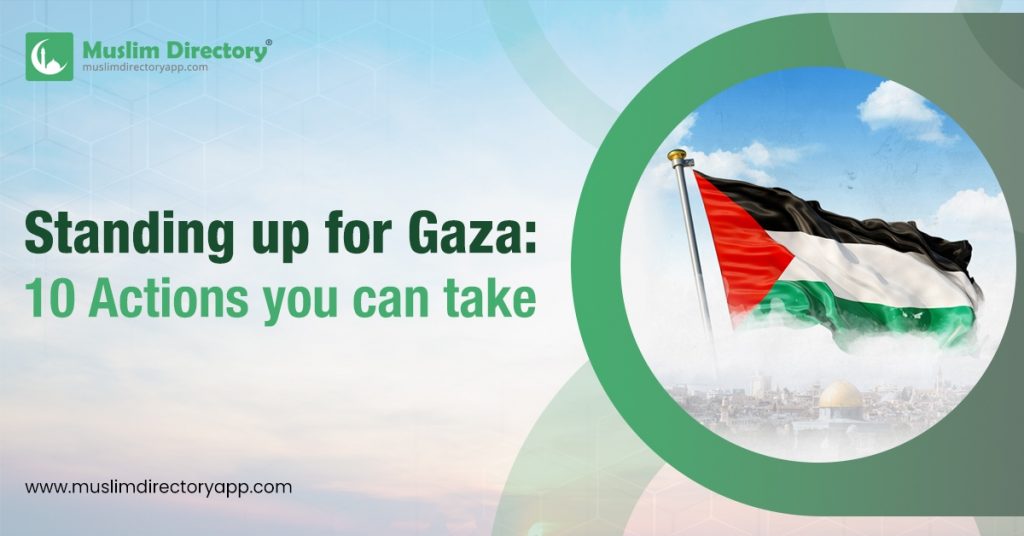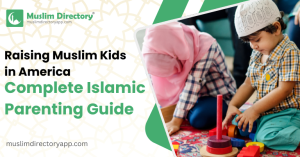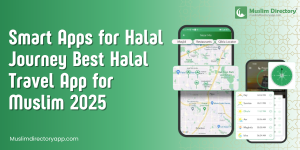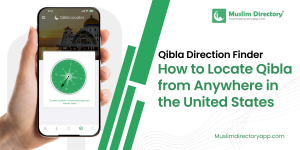The unfolding genocide in Gaza has ignited a global outcry, compelling Muslims and Non-Muslims worldwide to seek meaningful avenues for standing up against the brutality and advocating for justice. The plight of Gaza has transcended geographic borders, resonating with people from diverse backgrounds, cultures, and beliefs. The global community stands united in its concern, recognizing the urgency of addressing the humanitarian crisis and putting an end to the violence that has left an indelible mark on the lives of those in Gaza.
From raising awareness about the historical context to actively supporting humanitarian efforts, each step outlined here is a call to contribute to a collective voice for change. At the heart of this guide is the recognition that change is most impactful when voices come together. By fostering a collective voice, individuals can contribute to a global movement that transcends borders and cultures. This movement is grounded in the shared values of compassion, justice, and the belief that every individual has a role to play in advocating for the rights and well-being of those affected by the genocide in Gaza.
The narrative is clear: the suffering in Gaza must end. Read on to find actionable steps that encompass education, advocacy, humanitarian support, and engagement on various fronts. As we delve into these facets, the overarching goal remains steadfast — to stand up against the genocide in Gaza and contribute to a collective effort that strives for justice, equality, and a future free from the shackles of violence and suffering.
1. Educate Yourself and Others
To truly advocate for Gaza, one must delve into the historical factors that have shaped the current affairs. Study the origins, including the Nakba, the treatment of the Palestinians, and the occupation. Understand the significance of relevant historical events and how they have influenced the current state of affairs.
Educating yourself about the blockade’s consequences is crucial. Explore how restrictions on the movement of people and goods have affected the daily lives of Gazans, from limited access to healthcare and education to economic struggles. Recognize the humanitarian crisis exacerbated by the blockade and its implications on mental health and overall well-being.
Go beyond statistics and headlines by understanding the lived experiences of individuals in Gaza. Learn about personal stories that illustrate the impact of the conflict on families, children, and communities. Humanizing the narrative creates a deeper emotional connection and reinforces the urgency of addressing the situation.
Once armed with knowledge, share it proactively. Engage in conversations with friends, family, and colleagues, fostering an open dialogue that encourages questions and discussions. Utilize social media platforms not just for sharing news but also for contextualizing events and fostering empathy.
Consider organizing events within your community, such as panel discussions, seminars, or film screenings. Bringing experts, activists, or individuals with firsthand experience to speak and provide invaluable insights. Create spaces for dialogue where people can ask questions and learn from one another.
2. Support Boycott, Divestment, Sanctions (BDS) Efforts: Non-violent Economic Pressure
The Boycott, Divestment, Sanctions (BDS) movement represents a call for non-violent economic pressure on Israel, advocating for compliance with international law and respect for Palestinian rights. Understanding the goals and principles of the BDS movement is essential for those seeking effective and non-violent means to address the genocide in Gaza.
Supporting BDS efforts begins with conscientious consumer choices. Individuals can boycott products and companies that are complicit in the occupation or engage in activities inconsistent with human rights standards. This includes researching and avoiding the purchase of goods and services that contribute to the perpetuation of the genocide.
Divestment is a powerful tool for individuals, institutions, and organizations to disassociate from businesses involved in human rights violations. This entails redirecting financial investments away from companies contributing to the atrocities in Gaza, and instead investing in businesses that support Palestine. By aligning financial decisions with ethical considerations, individuals contribute to the economic pressure exerted by the BDS movement. For a free list of Muslim-owned business across the U.S., download Muslim Directory App.
Individuals can play a role in encouraging institutions, such as universities, religious organizations, and businesses, to implement sanctions against Israel. This involves advocating for policies that restrict engagement with entities contributing to the perpetuation of the genocide. By fostering a culture of ethical responsibility, individuals contribute to a broader movement for accountability.
By actively supporting these efforts, individuals contribute to a strategy rooted in peaceful resistance. The collective impact of BDS relies on individuals recognizing their role in exerting economic pressure and advocating for change without resorting to violence.
Supporting BDS is not just an individual endeavor but a contribution to a global movement. As more individuals participate, the cumulative impact of economic pressure grows. By encouraging others to join these efforts and raising awareness about the principles behind BDS, individuals contribute to a shared commitment to justice and human rights on an international scale.
Through dialogue, unity, and strategic non-violent actions, individuals become integral components of a global movement striving for justice, peace, and respect for human rights in the region.
3. Use Social Media for Advocacy

Craft a narrative that not only highlights the injustices but also emphasizes the resilience and strength of the people in Gaza. Share stories that showcase the human side of the conflict, illustrating the aspirations, struggles, and everyday life of Gazans.
Incorporate visual elements into your social media posts. Images and videos can convey the emotional impact of the conflict more effectively than text alone. Share powerful visuals that capture the reality on the ground, from protests and demonstrations to the daily challenges faced by Gazans.
Stay attuned to social media trends and utilize relevant hashtags to increase the visibility of your posts. This not only ensures your message reaches a broader audience but also contributes to ongoing conversations about Gaza. Consistent and strategic use of hashtags can amplify the impact of your advocacy.
Identify and engage with influencers, activists, and organizations that are already working on Gaza-related issues. Collaborate with them to amplify your message and reach a wider audience. Tagging and mentioning influential figures in your posts can increase the likelihood of your content being shared.
Transform your social media presence into a platform for collective action. Encourage your followers to share your posts, engage in discussions, and participate in online campaigns. Establish a sense of community by creating spaces where people feel empowered to contribute to the advocacy efforts.
The situation in Gaza is dynamic, with developments occurring rapidly. Stay informed about the latest news, policy changes, and international responses. Adapt your social media strategy accordingly, ensuring that your advocacy remains relevant and responsive to the evolving circumstances in Gaza.
In combining education with strategic social media advocacy, individuals can contribute significantly to the broader movement advocating for justice in Gaza. By fostering understanding, empathy, and a sense of collective responsibility, this approach empowers people to take informed actions and be part of a global call for change.
4. Support Humanitarian Efforts
In the midst of the ongoing genocide in Gaza, supporting humanitarian organizations becomes essential for those grappling with the immediate and pressing challenges. These organizations tirelessly navigate complex terrains to deliver aid to the most vulnerable, providing a crucial buffer against the harsh realities of conflict. Your financial support becomes a catalyst for positive change, offering tangible relief to civilians.
Your donations serve as a direct channel for providing much-needed resources to those on the ground. From medical assistance and food distribution to the provision of essential supplies, humanitarian organizations are at the forefront of addressing urgent needs. Your contribution, regardless of its size, translates into concrete actions that alleviate suffering and foster hope in the face of adversity.
Supporting humanitarian efforts is not just about responding to immediate crises but also empowering local communities. Many organizations on the ground engage with local partners, working collaboratively to ensure that aid reaches those who need it most. By contributing, you play a role in sustaining local initiatives that prioritize the well-being and resilience of the affected communities.
Choose reputable humanitarian organizations that are committed to transparency and accountability. Many organizations provide detailed reports on how funds are utilized, ensuring that your contribution directly benefits those it is intended to help. Being informed about the organizations you support ensures that your generosity translates into impactful and sustainable aid.
Beyond the immediate impact on individuals’ lives, your support contributes to a broader collective effort. Humanitarian organizations, through their networks and collaborations, amplify the reach of individual contributions, creating a unified front against the challenges faced by the people of Gaza. Your financial backing, when combined with others, becomes a powerful force for positive change.
5. Advocate for Policy Change: Amplifying Your Voice
Advocacy is a vital avenue for individuals to contribute to long-term change in Gaza. By engaging with political representatives and urging policy changes, you become a part of the broader movement for justice, human rights, and a peaceful resolution. Write letters, make phone calls, and send emails detailing the humanitarian crisis and urging immediate action. Communicate the urgency of addressing human rights violations and emphasize the need for a ceasefire.
Attend town hall meetings organized by your elected officials. These forums provide an opportunity to voice your concerns in a public setting, ensuring that your message reaches a broader audience. By actively participating, you contribute to shaping public discourse and holding political representatives accountable for their positions on Gaza-related issues.
Participate in advocacy campaigns organized by various groups and organizations. These campaigns often center around specific policy goals, such as ending arms sales to parties involved in the conflict, advocating for diplomatic interventions, or urging a ceasefire. Your involvement amplifies the collective voice demanding policy changes that align with principles of justice and human rights.
Urge your elected officials to support resolutions that call for a ceasefire and an end to the blockade of humanitarian aid. Many international bodies and institutions regularly discuss and vote on resolutions related to the Gaza situation. By mobilizing support for resolutions aligned with human rights and international law, you contribute to a global push for lasting peace in the region.
Advocacy is not a one-time effort but a sustained and cumulative process. By consistently engaging with your political representatives, attending meetings, and participating in advocacy campaigns, you help build momentum for change. Your commitment to policy advocacy becomes a powerful force that shapes political will and influences decisions that can impact the trajectory of the Gaza genocide.
In supporting humanitarian efforts and advocating for policy change, individuals play integral roles in addressing the immediate needs of those affected by the conflict while also contributing to long-term solutions. The combination of direct support and active advocacy forms a dynamic and comprehensive approach towards standing up against the brutality in Gaza.
6. Participate in Peaceful Protests: A Voice in Unity

Participating in peaceful protests serves as a tangible expression of solidarity with the people of Gaza. It goes beyond words, allowing individuals to actively stand alongside those affected. By joining or organizing protests, individuals contribute to a visible and collective demonstration of concern that captures the attention of both local communities and the wider world.
Public demonstrations have the power to convey a collective message of concern, urging governments and international bodies to take notice. Through unified chants, banners, and the sheer presence of a diverse group of individuals, protesters amplify the urgency of addressing the humanitarian crisis in Gaza. The impact of this collective message resonates far beyond the immediate protest site.
Effective coordination is essential for maximizing the impact of protests. Collaborate with local advocacy groups, mosques, and community organizations to ensure a unified front. By pooling resources and mobilizing diverse communities, protests become more impactful, reaching a broader audience and fostering a sense of shared responsibility for the situation in Gaza.
The principles of justice and equality should guide every aspect of a protest. Ensure that demonstrations are peaceful, respectful, and aligned with ethical principles. Emphasize the importance of non-violent expression, maintaining a focus on the humanitarian aspect of the conflict. By adhering to these principles, participants contribute to a protest environment that reflects the values they seek to promote.
7. Engage with Interfaith Initiatives: Bridging Divides for Justice
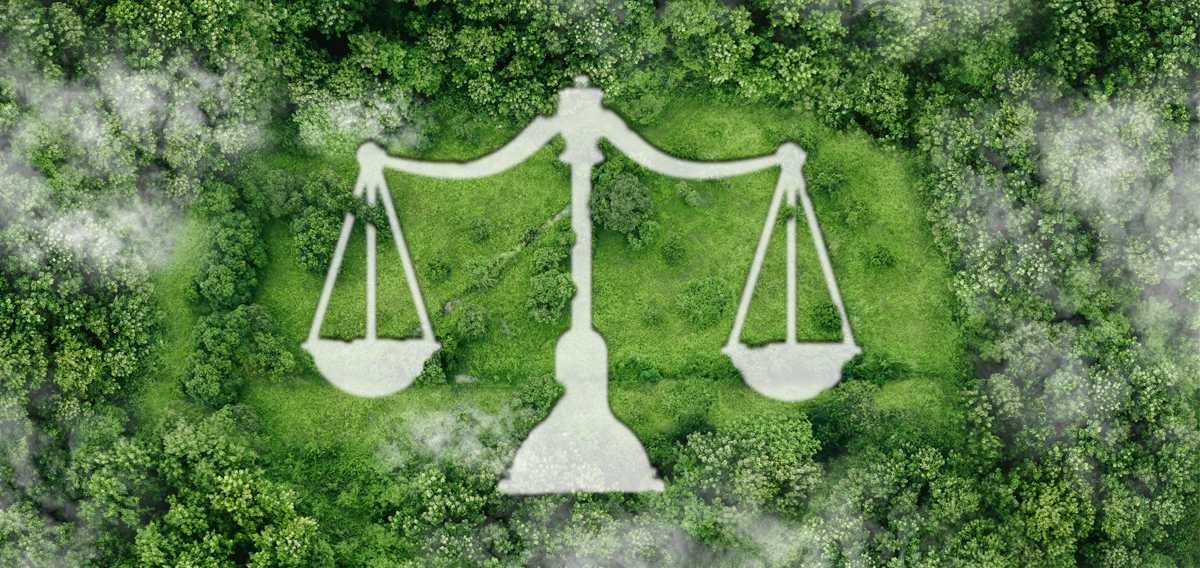
Engaging in interfaith initiatives is a powerful step towards fostering understanding and empathy among diverse religious communities. In the context of the Gaza genocide, building bridges becomes essential. By actively participating in interfaith dialogues, individuals contribute to dismantling stereotypes and prejudices, paving the way for genuine connections.
Interfaith initiatives provide a platform for collaboration, encouraging participants to work together in pursuit of shared values. Despite religious and cultural differences, there exists a common ground anchored in the universal principles of justice and peace. By identifying and emphasizing these shared ideals, individuals contribute to a broader movement that transcends divisive narratives.
When individuals from different religious backgrounds stand united in their commitment to justice, their collective voice becomes a powerful force for change. This unity sends a resounding message that transcends borders and barriers, reinforcing the urgency of addressing the humanitarian crisis in Gaza. In the face of adversity, unity becomes a source of strength.
Interfaith efforts play a crucial role in promoting unity by emphasizing the shared responsibility to address global challenges. By actively engaging in interfaith initiatives, individuals lay the groundwork for a broader, interlinked movement for justice and peace worldwide.
8. Engage in Grassroots Activism: Building Change from the Ground Up
Grassroots activism begins at the local level, emphasizing the power of communities to effect change. By becoming involved in grassroots movements dedicated to justice and human rights, individuals contribute to a global movement that builds change from the ground up. Local actions have the potential to resonate globally, creating a ripple effect of awareness and advocacy.
Attend local meetings organized by grassroots movements to stay informed and engaged. Volunteer your time to actively contribute to initiatives that align with principles of justice and human rights. By immersing yourself in local activism, you become an integral part of the movement, fostering a sense of shared responsibility and collective action. Collaborate with like-minded individuals to organize events, workshops, and awareness campaigns. These initiatives serve as crucial tools for educating and mobilizing communities.
By creating spaces for dialogue, sharing information, and fostering awareness, grassroots activists contribute to building informed and empowered communities capable of advocating for change. Grassroots activism empowers communities to be active agents of change. By organizing events that address local and global issues, activists create environments that foster critical thinking and civic engagement. This empowerment is not just about addressing immediate concerns but instilling a lasting commitment to justice, human rights, and social responsibility.
9. Amplify Palestinian Voices: Shaping the Narrative
Media coverage often tends to be one-sided, offering limited perspectives on what’s truly happening in Gaza. Amplifying Palestinian voices is a critical step in counteracting this imbalance. By actively seeking out and sharing stories, art, and perspectives from Palestinians, individuals contribute to a more nuanced and comprehensive understanding of the human impact of the conflict.
Take advantage of various platforms, including podcasts, blogs, and social media, to amplify Palestinian voices. Share personal narratives, artistic expressions, and perspectives that provide insight into the daily lives, aspirations, and struggles of Palestinians. Utilize these platforms as tools for shaping a narrative that humanizes the experiences of those directly affected by the conflict.
Diversity within the Palestinian narrative should be acknowledged and celebrated. By creating space for a range of voices, individuals contribute to a more inclusive and authentic portrayal of Palestinian experiences. This inclusivity helps break down stereotypes and fosters a deeper understanding of the diversity within the Palestinian community.
10. Stay Resilient and Persistent: Navigating the Advocacy Journey
Bringing about change requires resilience in the face of challenges. Understand that progress may be incremental, and setbacks are inevitable. Embrace the journey with a mindset of resilience, acknowledging that each effort, no matter how small, contributes to the larger goal of justice for Gaza.
Stay informed about the developments in Gaza, remaining engaged with ongoing advocacy efforts. Regularly update your knowledge of the situation, policy changes, and international responses. Being well-informed enhances the effectiveness of your advocacy, allowing you to adapt your approach to the evolving circumstances.
Collaborate with others who share your commitment to making a positive impact. Join forces with advocacy groups, grassroots movements, and like-minded individuals to create a collective impact. In the face of the ongoing brutality in Gaza, standing up for justice and peace demands not just sympathy but concerted, multifaceted action. The journey towards positive change involves education, advocacy, and unwavering humanitarian support. As individuals, our collective voices hold the power to shape narratives, influence policies, and create a wave of compassion that can resonate across borders.
By uniting our voices, we contribute to a global movement advocating for the rights and well-being of the people of Gaza. This movement extends beyond geographical boundaries, transcending cultural and religious differences. It is a collective call for justice, equality, and a future where the basic human rights of every individual are upheld and respected.
Individual actions, though seemingly small, collectively create a powerful force for change. Engaging in peaceful protests, supporting grassroots movements, amplifying Palestinian voices, and participating in interfaith initiatives are individual steps that, when combined, become a symphony of resilience and advocacy. It is through these actions that we send a resounding message: the world stands in solidarity with the people of Gaza, and their cries for justice will not go unheard.
Conclusion
Our ultimate goal is to work towards a world where justice, equality, and peace prevail. This vision requires persistent effort, resilience in the face of challenges, and a commitment to staying informed and engaged. Each individual’s contribution, regardless of its scale, is a crucial piece of the larger puzzle. It is a testament to our collective determination to build a future where human rights are not negotiable and where every person can live in peace and dignity.
The journey towards justice for Gaza is one that we embark on together. It is a journey that requires continuous learning, active advocacy, and compassionate support. Through our individual and collective efforts, we contribute to the momentum for change, holding steadfast to the belief that a world of justice, equality, and peace is not just a distant aspiration but an achievable reality.
